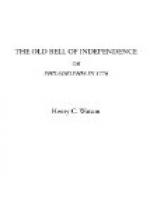“In the American camp, interspersed between groups of tents and stacks of arms, might be seen little knots of weary soldiers seated on the ground, resting from the fatigues of the day, and talking in a low but animated tone of the coming contest.
“Suddenly the tattoo sounded,—not loud and shrill, as on ordinary occasions, but in a subdued and cautious manner, as if fearful of being heard by the British, whose white tents might be seen in the distance. Obedient to the signal, the greater part of the soldiers assembled in front of the marquee of the commander, near the centre of the encampment.
“All was hushed in expectation: soon the tall form of Washington, wrapped in his military cloak, and attended by a large body of officers, was seen advancing in their midst. All present respectfully saluted them, to which they bowed courteously, and then took their seats upon camp-stools set for them by a servant. The venerable Joab Prout, chaplain of the Pennsylvania line, then stood upon the stump of a tree, and commanded silence—for it was the hour of prayer.
“Here was a scene of moral grandeur unsurpassed by anything in the annals of war. There, on that still, cool evening, when the sky was darkening into night, were assembled some eight thousand men; very many of whom would never look upon the glorious sunset again. From the humble cottages in the quiet valley of the Connecticut—from the statelier mansions of the sunny South—at the call of liberty, they had rushed to the tented field; and now, on the eve of battle, as brethren in heart and deed, had met together to implore the God of battles to smile upon their noble cause.
“Oh! it was a thrilling and an august sight! The mild and dignified Washington looked around him with proud emotion, and turned enquiringly to the fair young stranger, Lafayette, beside him, as if to ask, ’Can such men as these be vanquished?’
“The bold and fearless Wayne was there; the undaunted Pulaski, and the whole-hearted Kosciusko; and they bowed their heads in reverence to Him in whose presence they were worshipping.
“Never beneath the vaulted dome of the stately temple—never from the lips of the eloquent divine—was seen such a congregation, or was heard such a discourse, as on that September evening, from that humble old man, with his grey locks streaming in the wind.
“With a firm, clear voice, that re-echoed to the distant hills, he announced his text:—
’They that take the sword shall perish by the sword.’
Then, straightening himself to his full height, and his eye beaming with a holy feeling inspired by the time and place, he commenced:—
“’They that take the sword
shall perish by the sword.’
’Soldiers and Countrymen:
We have met this evening perhaps for the last time. We have shared the toil of the march, the peril of the fight, the dismay of the retreat—alike we have endured cold and hunger, the contumely of the internal foe, and outrage of the foreign oppressor. We have sat, night after, night, beside the same camp-fire, shared the same rough soldiers’ fare; we have together heard the roll of the reveille, which called us to duty, or the beat of the tattoo, which gave the signal for the hardy sleep of the soldier, with the earth for his bed, the knapsack for his pillow.




